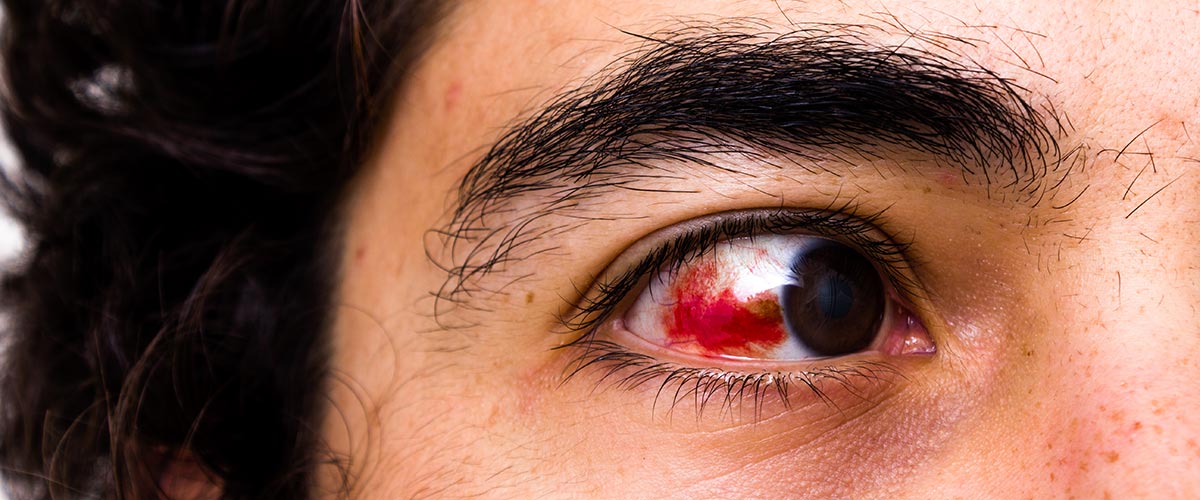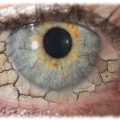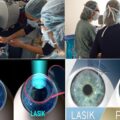A corneal abrasion is a superficial scratch on the clear, protective “window” at the front of your eye (cornea). Your cornea can be scratched by contact with dust, dirt, sand, wood shavings, metal particles, contact lenses or even the edge of a piece of paper.
Housework and sports are two of the most common causes of eye injuries. But even cooking or playing with your dog or cat can get you a scratched eye. You might have symptoms right away or the symptoms may start or get worse hours after the injury.
Symptoms of an Eye Scratch
If the white part of your eye is scratched, you may see a spot of blood, a scratched line or an area of general redness on your conjunctiva or sclera.
Other common symptoms of a scratched eye include:
- Eye pain
- A feeling that something is stuck in your eye
- Tearing
If you scratch or scrape the cornea — the clear, round dome at the front of the eye, that covers the iris and pupil — this is called a corneal abrasion. If a corneal abrasion scars the cornea, it can permanently affect vision. Other corneal abrasion symptoms can include:
- Blurry vision
- Sensitivity to light
- Headache.
How to Treat a Scratched Eye to Help You Sleep Well
A study published in the Clinical Journal of the American Academy of Ophthalmology, shows that eye problems may be a significant risk factor for sleep disorders. See your ophthalmologist if you scratch your eye. If you’re in a lot of pain, are having any trouble seeing or are worried about your eye, go to the emergency room.
Most corneal abrasions and eye scratches are minor and will heal on their own in a few days, but you should still see a doctor to get an eye exam.
Your ophthalmologist may treat an eye scratch with antibiotic eye drops or ointment. You may be given prescription steroid eye drops to reduce inflammation and reduce the chance of scarring. You may also be given lubricating eye drops to make you more comfortable.
There are no over-the-counter eye drops specifically for eye scratches. If you have scratched your eye, you shouldn’t use any eye drops without asking a doctor first.
If you have a scratched eye, here are some things you should—and should not—do:
- DO rinse your eye with saline solution or clean water. If you don’t have an eyecup, use a small, clean glass. Rest the rim of the glass on the bone at the base of your eye socket, below your lower eyelid. The water or saline solution may flush the foreign object from your eye.
- DO blink. Blinking can help get rid of small bits of dust or sand in your eye.
- DO pull your upper eyelid over your lower eyelid. The lashes from your lower eyelid may be able to brush away any foreign object caught underneath your upper eye lid.
- DO wear sunglasses. If your eye is sensitive to light because of the scratch, sunglasses will make you more comfortable while you heal.
- DON’T rub your eye. Rubbing your eye can make the scratch worse.
- DON’T touch your eye with anything. Fingers, cotton swabs and other objects won’t help remove any foreign objects and could hurt your eye more. The object that caused the scratch may be gone even though you still feel like something is in your eye.
- DON’T wear your contact lenses. Wearing your contact lenses will slow the healing process and could cause complications, like contact lens-related infections.
- DON’T use redness-relieving eye drops. Over-the-counter redness-reducing eye drops can be painful if you have an eye scratch and they won’t help you heal any faster.
How can I protect myself from eye injuries?
Your eye doctor can tell you how to protect your eyes. Wearing eye protection can reduce the number and severity of eye injuries. Only 3-mm polycarbonate lenses should be used in protective sports eyewear. These lenses are available in plain and prescription forms. Polycarbonate lenses are impact resistant. They also are the thinnest and lightest lenses available.
Never wear protective devices without lenses. Contact lenses and sunglasses will not protect your eyes from blunt or penetrating injuries. In sports, wearing a helmet or faceguard cannot protect your eyes, because your eyes are still exposed to an opponent’s fingers or other sports equipment. The helmet also can be knocked off, leaving your eyes vulnerable to injury. Your eye doctor can help you choose eye protection for your specific sport.






